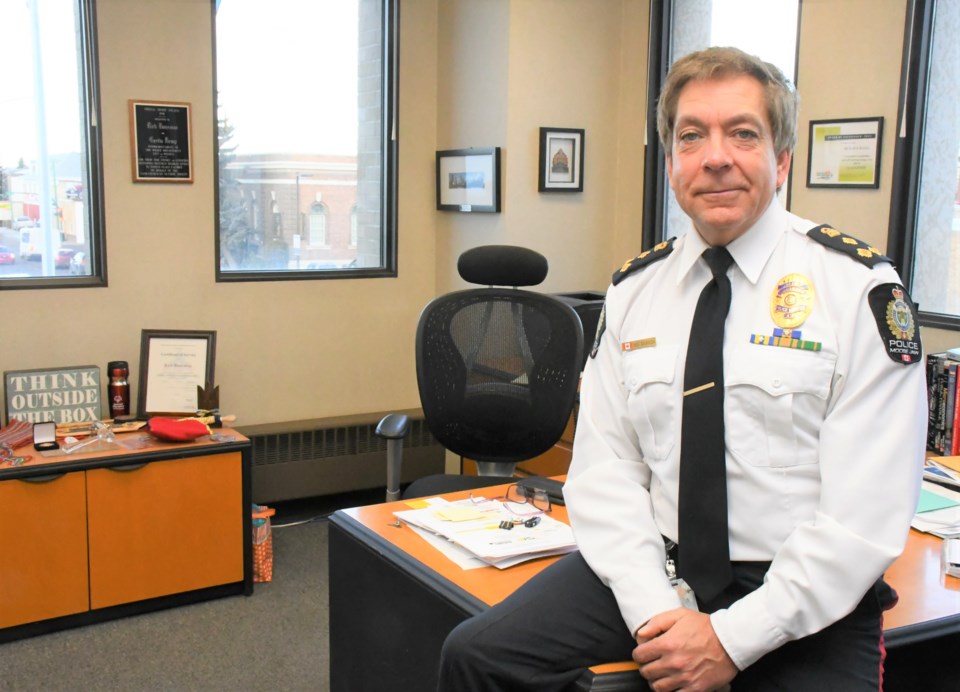Moose Jaw police encountered more firearms last year when responding to calls than in the past, an issue that is related to gang activity and the drug trade, says the police chief.
“We’re not alone in that. Other police services are reporting that as well,” said Police Chief Rick Bourassa during a year-in-review conversation.
There were about 10 incidents in 2019 where the Moose Jaw Police Service (MJPS) relied on other police services, such as Regina, Saskatoon and the RCMP, for tactical support, he said. While the MJPS can contain situations, it does not have a dedicated tactical unit.
Those dangerous situations have become more frequent because of firearms usage, he continued. Therefore, the organization began the process to increase its tactical capability by having two members develop a tactical unit; this project will continue in 2020.
With a chuckle, Bourassa emphatically stated that the Moose Jaw Police Service would not ask city council for money in 2021 to purchase an armoured tactical vehicle, or “tank,” as some people have referred to it.
Looking back
Last year “was an interesting year” for the MJPS, Bourassa said. The organization either continued or started several initiatives, while it also faced some challenges.
One challenge was in managing staffing levels. Several people were away either for parental issues or took medical leave. There were also a few surprise retirements. Since it takes one year to fill vacancies due to training, the police service had to move officers around to fill holes. Bourassa expects this year to be more stable on that front.
Meanwhile, the MJPS increased its K-9 unit to four teams from two. There is now one handler and one dog on every shift.
The organization also upgraded its radio system so its members have modern equipment. The MJPS will iron out the system’s bugs this year and begin to set aside money for a new system in the future.
The Police and Crisis Team (PACT) was implemented and has been “wildly successful,” Bourassa said. The team — composed of police and mental health professionals — has reduced the burden on frontline officers, especially with calls about mental health.
Another officer will be added to that team in 2020 so there are two police and two mental health workers to meet the needs of residents.
About 25 per cent of the calls to which police respond are crime-related, Bourassa said. The other 75 per cent deal with community disruptions, such as mental health or addictions issues.
There has also been an increase in aggression and violent behaviours, based on reports from officers. Bourassa was unsure if those behaviours were related to more drug use — especially cocaine and methamphetamines — but thought it could be a cultural shift where physical confrontation is now acceptable to resolve conflict.
“We’re not alone in that. Other jurisdictions report those same things,” he added.
A strategy to deal with crystal meth was discussed but has not been fully developed yet. One aspect of this problem is dealing with supply while also gathering intelligence that leads to major seizures of drugs. Several agencies have come together to develop a strategy, but Bourassa noted he didn’t want to create a plan if another one had already been created elsewhere.
“The education component (is important) … and I’m hopeful that this year that (strategy will) come together,” he added.
Last year was the first full year cannabis was legal to consume. Moose Jaw police dealt with few cannabis-related issues, such as driving high. However, alcohol use and impaired driving continue to be a problem. One thing for which Bourassa was thankful this past Christmas was how few incidents involved impaired driving.
Looking ahead
The MJPS will work closely with the Saskatchewan Internet Child Exploitation (ICE) Unit this year since the organization has few resources in this area, said Bourassa. One member has been trained and given the proper software, while another member could also be trained to provide support.
“Like every place else, that does happen here and we need to have some capacity to address it,” he said.
Internally, the police service will have more regular mental health-related meetings for officers who work in difficult areas such as child abuse. This was started last year and will be expanded to include more officers, so it becomes similar to a regular medical checkup.
Protecting the community
Moose Jaw is a safe community, said Bourassa. It’s still possible to walk around feeling secure, even with some of the challenges out there. The police service works with its community partners to ensure people feel safe and welcomed, while it continues to work on the drug problem and attempts to disrupt the flow of those products into the community.
“We’ll continue to provide services that people need when they need them,” he added. “We’ve got a good, young police service now … it’s an exciting time for us.”




